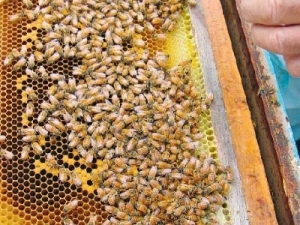Naki unveils the world’s most expensive manuka honey
Naki Honey, a New Zealand manuka apiary company, has crafted what is believed to be the world's most expensive honey.
 30 hectares of mānuka will be initially planted on Northland College land – an initiative that provides current and future employment opportunities for Kaikohe people.
30 hectares of mānuka will be initially planted on Northland College land – an initiative that provides current and future employment opportunities for Kaikohe people.
This week marked the first day of work for 11 Work and Income clients, who will be developing Northland College's mānuka plantation site.
30 hectares of mānuka will be initially planted on Northland College land – an initiative that provides current and future employment opportunities for Kaikohe people.
The Northland College Mānuka Initiative stems from the Tai Tokerau Northland Economic Action Plan which identifies 58 actions for stimulating the Northland economy.
Senior Regional Official, Ben Dalton is responsible for the government's delivery of the Action Plan and highlights the significance of the Northland College Manuka Initiative.
"The mānuka honey production industry as well as many other primary industries have been identified as a growing industry in Northland. That means there will be more jobs available, and skilled workers will be in demand," says Dalton.
"The 11 people have been trained in foundation forestry skills and will be working for 16 weeks. Solid training combined with solid experience on the job means these workers will be ready when new jobs open up. We want local primary industries to be able to employ skilled locals."
"The initiative not only provides work opportunities immediately, it also provides Northland College students the opportunity to study Apiculture through Lincoln University, and gain practical experience on site, giving them an upper hand for future employment," Dalton adds.
The Initiative is being implemented by Northland College and supported by Ministry for Primary Industries, Te Puni Kokiri and Ministry for Social Development.
Background information
With government support, an initial 30 hectares of Northland College land will be planted in high performing mānuka cultivars for honey production. By 2017, this is expected to extend to 100 hectares.
Knowing what mānuka cultivars to plant, and how the plantation is to be planted and managed for honey production are a result of successful scientific research to date that the Ministry for Primary Industries and Manuka Research Partnership (NZ) Ltd are investing in through the Primary Growth Partnership.
The mānuka site will provide revenue in the future for the College to reinvest.
The mānuka plantation site has the potential for high erosion and the mānuka will help stabilise the land to stop more erosion.
This initiative was a highlight of the Tai Tokerau Northland Economic Action Plan in February this year. 5 Ministers visited the school and planted mānuka trees on the school grounds to symbolise the significance of the project.
The Push-Up Challenge, an event which combines mental health and fitness, is set to launch in New Zealand in 2026.
Last month's Agritechnica event led to a wide group of manufacturers celebrating successes when the 2026 Tractor of the Year Competition winners, selected by a panel of European journalists, were announced in Hanover Germany.
According to the latest Federated Farmers banking survey, farmers are more satisfied with their bank and less under pressure, however, the sector is well short of confidence levels seen last decade.
Farmer confidence has taken a slight dip according to the final Rabobank rural confidence survey for the year.
Former Agriculture Minister and Otaki farmer Nathan Guy has been appointed New Zealand’s Special Agricultural Trade Envoy (SATE).
Alliance Group has commissioned a new heat pump system at its Mataura processing plant in Southland.

OPINION: The release of the Natural Environment Bill and Planning Bill to replace the Resource Management Act is a red-letter day…
OPINION: Federated Farmers has launched a new campaign, swapping ‘The Twelve Days of Christmas’ for ‘The Twelve Pests of Christmas’ to…